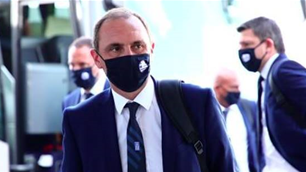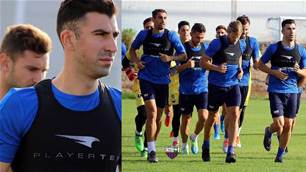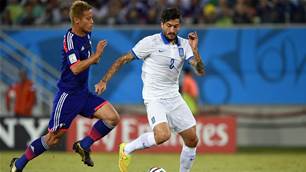By his own admission Angelos Charisteas will be best remembered for his winning goal in the final of Euro 2004.
He arrived at the championships as a 24-year-old who had built the foundations of an unremarkable career, toiling then as Werder Bremen's fourth-choice striker.
He left Portugal having capped the most remarkable of triumphs.
In the split second it took for him to execute his perfectly-timed header from an Angelos Basinas corner, Charisteas wrote his name in Greek folklore.
"Even in 50 years' time, everybody will remember that I scored the goal which made Greece the champions of Europe," he subsequently reflected to Dutch football magazine Voetbal International.
"We wrote history and my life changed completely at that point."
In truth Charisteas' career has not got close to reaching those dizzying heights since.
His place on the periphery of Bremen's first team did not change despite his Euro 2004 exploits and subsequent stints at Ajax and Feyenoord were similarly unsatisfying.
The Serres-born striker now finds himself at Nuremberg - who have been cast in a relegation battle this season. He has contributed just five goals in their fight against the drop.
But to judge Charisteas solely on his goal-scoring record would be unfair on a player who has never been a prolific marksman.
It is a fact not lost on his Greece manager Otto Rehhagel who has undoubtedly got the best from his talents.
It is not unfair to suggest that Charisteas' career with his country is far superior than at club level.
He took just two minutes to make his mark in the shirt of his homeland when he scored on his debut in a 3-3 draw against Russia in 2001.
In fact he added another in that game before scoring again in his next match against Germany.
It was an impressive start to his international career and came at the right time to catch the eye of his new international manager Rehhagel.
The German coach arrived in 2001 with a reputation for being a disciplinarian who required his players to play to his game plan or not at all.
His arrival also coincided at a point where the Greek players were derided for their ambivalence towards the national team.
Rehhagel was not only tasked with restoring the players' pride in representing their country but also in turning their fortunes around on the pitch.
In Charisteas he found a striker who suited his blueprint for success.
Strong and tall, Charisteas fitted the mould of a target man who was also willing to help his defenders in Rehhagel's feted shielding approach.
Where some strikers shun their defensive responsibility, Charisteas gives the impression that he wouldn't mind being saddled with a few more.
But the luxury of putting a shift in is something not all of Charisteas' managers have been unwilling to afford him.
After arriving at Bremen in the summer of 2002 for a then club-record fee of 3 million euros, Charisteas made a solid start to life in Germany, scoring nine goals in 31 appearances.
However, his first-team opportunities dried up in the next season as manager Thomas Schaaf preferred Brazilian striker Ailton and Ivan Klasnic as his front pairing.
The duo would score 41 league goals between them and with Johan Micoud also enjoying a stellar season, netting 10 goals, Bremen would lift the German title.
Their form however left Charisteas to cool his heels on the substitutes' bench as he made 17 of his 24 Bundesliga appearances as a replacement.
That summer Charisteas would make his name in Portugal.
His equaliser in the group stage against Spain would prove crucial to their qualification to the knockout stage where his goals against France and, of course, Portugal in the final would prove decisive.
Despite the fanfare surrounding him, Charisteas would return to the substitutes' bench on his return to Bremen after the club replaced Ailton, who left for Schalke, with Germany international Miroslav Klose.
Charisteas made just two starts during the Bundesliga season, as his place in the Greece team also came under question with Rehhagel urging him to move clubs in order to play first-team football.
His move finally materialised in January 2005, signing for Ajax, however Charisteas' choice of clubs proved ill-conceived as he found himself further down the pecking order.
Caught behind Klaas-Jan Huntelaar, Markus Rosenberg, Ryan Babel and Rydell Poepon, the Greece striker made just five appearances during the campaign.
Another move in August 2006, this time to Feyenoord, proved equally as problematic as the Rotterdam fans voiced their disapproval at the signing of a player from their arch-rivals.
A year later Charisteas found himself back in Germany with Nurnberg where he has finally found first-team football, albeit with a struggling team.
However, it is perhaps no coincidence that since finding first-team football Charisteas has seen his performances with the national team improve as well.
He scored three times during their successful campaign to reach this summer's championships to move him level in fourth place with Nikos Machlas in Greece's all-time list of scorers with 18 strikes.
And despite his nomadic existence since Euro 2004, you would not put it past Charisteas to add to that figure, and his international reputation, when he gets the chance to pull on the Greek shirt again in Austria and Switzerland.
He left Portugal having capped the most remarkable of triumphs.
In the split second it took for him to execute his perfectly-timed header from an Angelos Basinas corner, Charisteas wrote his name in Greek folklore.
"Even in 50 years' time, everybody will remember that I scored the goal which made Greece the champions of Europe," he subsequently reflected to Dutch football magazine Voetbal International.
"We wrote history and my life changed completely at that point."
In truth Charisteas' career has not got close to reaching those dizzying heights since.
His place on the periphery of Bremen's first team did not change despite his Euro 2004 exploits and subsequent stints at Ajax and Feyenoord were similarly unsatisfying.
The Serres-born striker now finds himself at Nuremberg - who have been cast in a relegation battle this season. He has contributed just five goals in their fight against the drop.
But to judge Charisteas solely on his goal-scoring record would be unfair on a player who has never been a prolific marksman.
It is a fact not lost on his Greece manager Otto Rehhagel who has undoubtedly got the best from his talents.
It is not unfair to suggest that Charisteas' career with his country is far superior than at club level.
He took just two minutes to make his mark in the shirt of his homeland when he scored on his debut in a 3-3 draw against Russia in 2001.
In fact he added another in that game before scoring again in his next match against Germany.
It was an impressive start to his international career and came at the right time to catch the eye of his new international manager Rehhagel.
The German coach arrived in 2001 with a reputation for being a disciplinarian who required his players to play to his game plan or not at all.
His arrival also coincided at a point where the Greek players were derided for their ambivalence towards the national team.
Rehhagel was not only tasked with restoring the players' pride in representing their country but also in turning their fortunes around on the pitch.
In Charisteas he found a striker who suited his blueprint for success.
Strong and tall, Charisteas fitted the mould of a target man who was also willing to help his defenders in Rehhagel's feted shielding approach.
Where some strikers shun their defensive responsibility, Charisteas gives the impression that he wouldn't mind being saddled with a few more.
But the luxury of putting a shift in is something not all of Charisteas' managers have been unwilling to afford him.
After arriving at Bremen in the summer of 2002 for a then club-record fee of 3 million euros, Charisteas made a solid start to life in Germany, scoring nine goals in 31 appearances.
However, his first-team opportunities dried up in the next season as manager Thomas Schaaf preferred Brazilian striker Ailton and Ivan Klasnic as his front pairing.
The duo would score 41 league goals between them and with Johan Micoud also enjoying a stellar season, netting 10 goals, Bremen would lift the German title.
Their form however left Charisteas to cool his heels on the substitutes' bench as he made 17 of his 24 Bundesliga appearances as a replacement.
That summer Charisteas would make his name in Portugal.
His equaliser in the group stage against Spain would prove crucial to their qualification to the knockout stage where his goals against France and, of course, Portugal in the final would prove decisive.
Despite the fanfare surrounding him, Charisteas would return to the substitutes' bench on his return to Bremen after the club replaced Ailton, who left for Schalke, with Germany international Miroslav Klose.
Charisteas made just two starts during the Bundesliga season, as his place in the Greece team also came under question with Rehhagel urging him to move clubs in order to play first-team football.
His move finally materialised in January 2005, signing for Ajax, however Charisteas' choice of clubs proved ill-conceived as he found himself further down the pecking order.
Caught behind Klaas-Jan Huntelaar, Markus Rosenberg, Ryan Babel and Rydell Poepon, the Greece striker made just five appearances during the campaign.
Another move in August 2006, this time to Feyenoord, proved equally as problematic as the Rotterdam fans voiced their disapproval at the signing of a player from their arch-rivals.
A year later Charisteas found himself back in Germany with Nurnberg where he has finally found first-team football, albeit with a struggling team.
However, it is perhaps no coincidence that since finding first-team football Charisteas has seen his performances with the national team improve as well.
He scored three times during their successful campaign to reach this summer's championships to move him level in fourth place with Nikos Machlas in Greece's all-time list of scorers with 18 strikes.
And despite his nomadic existence since Euro 2004, you would not put it past Charisteas to add to that figure, and his international reputation, when he gets the chance to pull on the Greek shirt again in Austria and Switzerland.
Copyright (c) Press Association
Related Articles

The former Socceroo, A-League star revamping Greek football

Meet Australia’s talented Haris Stamboulidis













